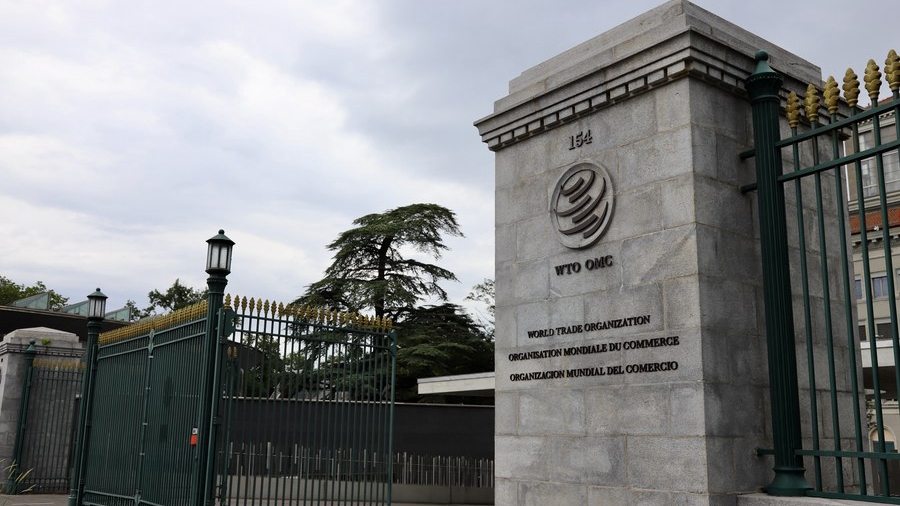
An exterior view of the World Trade Organization (WTO) headquarters in Geneva, Switzerland, July 15, 2020. [Photo/Xinhua]
By Hannan Hussain
On January 27, the European Union said it launched a case against Beijing at the World Trade Organization (WTO) for "discriminatory trade practices" against Lithuania. "These actions, which appear to be discriminatory and illegal under WTO rules, are harming exporters both in Lithuania and elsewhere in the EU, as they also target products with Lithuanian content exported from other EU countries," said the European Commission in a press release.
It escapes no one that the falsehoods informing Brussels' WTO case are a direct result of Vilnius' anti-China lobbying. Lithuanian Foreign Minister, Gabrielius Landsbergis, has been desperate to enlist the bloc's support against Beijing as Lithuania's flagrant violations of the one-China policy stand repeatedly exposed.
From baseless allegations of Beijing's "economic coercion" to a "coordinated" economic attack on Lithuanian businesses. Vilnius has played the anti-China card and manufactured implications for Europe, all to serve some fundamental objectives: change the conversation around its neglect of the one-China policy, and continue to sustain contacts with Taiwan authorities.
But this toxic political campaign will hit a brick wall at the WTO. Recall that in December, Beijing made it categorically clear that accusations of Lithuanian goods being denied at Chinese customs, import restrictions, and so-called pressuring of multinational companies to discard Lithuanian parts, have zero truth to them. This is important, because the same groundless allegations constitute the core of Brussels' so-called "evidence" against China's alleged trade restrictions on Lithuania.
More deeply, by playing directly into Lithuania's agenda for now, serious questions surround the EU's conception of credible action at the WTO. I challenge the assertion that these WTO dispute settlement consultations with Beijing are a matter of bloc unity, or that filing the case is an imperative to pushback against genuine breaches of WTO rules.
That is all a very poor sell, considering that the bloc's narrative of "discriminatory trade practices against Lithuania" is powered by empty allegations of the past, directly undermining the EU's stated claim of having "built up" evidence of various types of Chinese restrictions.
China hawks in Lithuania have been warned: it is this glaring discord between allegation and evidence that could make all the difference at the trade body. Beijing's firm regard for WTO rules reflects in its conduct of foreign trade in line with those rules, a record of compliance that scotches speculation to the contrary.
"Commencing in or around the final quarter of 2021, entities established in Lithuania began encountering difficulties relating to goods due to be exported from China to Lithuania. Those difficulties include failures on the part of the Chinese customs authorities to process requests for customs clearance for export in due time, or at all," alleged EU's WTO Ambassador João Aguiar Machado's consultation request letter sent to his Chinese counterpart.
Denying credence to those allegations is the fact that established channels were already in place to facilitate any export-related difficulties faced by Lithuanian entities, or foreign companies in general. So one wonders, where is the evidence that Lithuanian entities were kept from reporting to competent authorities in China on export-related issues?
One could be forgiven for expecting Brussels, a top trading partner, to do more than just take Vilnius' preposterous trade allegations at face-value.
Finally, Beijing is correct to remind the world that the fundamental issue with Lithuania is political, not economic. Lithuania's consistent attempts at pursuing unwarranted contacts with Taiwan authorities, its support for separatist forces, and its refusal to respect China's sovereign red lines, are all overarching proof.
More importantly, as Vilnius' facade of committing to "the one-China policy" stands deeply compromised, its immediate instinct is to put its weight behind the "economic coercion" hoax.
For Brussels, all this means a reality check. It's case at the WTO can easily be read as an implicit endorsement of Lithuania's toxic anti-China campaign. The same case that a wealth of falsehoods suggests would be dead on arrival.
The author is a foreign affairs commentator and author.

 中文
中文



